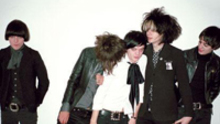In recent times, I have seen two of the most talked about new bands of the moment, Savages and Palma Violets. Despite both being positioned as the ‘future’ of guitar music, and, I might add, with some justification for a change, what fascinated me was the make up of the audience. Unlike previous new band waves, both gigs delivered people from 18 to 50 or so, all engaged and enjoying the new band in front of them.
I mention this as it helps to add context to the latest twist and turns of Radio One. Following controller Ben Cooper’s outrage that ‘festival dads’ would not leave his station alone and were skewing his demographics, came the anointment of Nick Grimshaw to sainted status as the latest ‘saviour of Radio One’ replacing the incumbent - and now discredited - Chris Moyles. Leaving aside the politburo nature of Radio One’s replacement strategy (you sometimes wonder if there is a gulag under Broadcasting House for old DJs), Radio One’s obsession with age is proving an embarrassment to anyone with a full understanding of our current pop culture.
In some ways picking on Ben Cooper doesn’t really yield results. He is taxed with the near impossible job of artificially creating a station profile that works to strictly drawn age barriers that simply do not exist in any arena of popular music in 2012. Whether pop, indie, rap, grime or any of the other myriad sub-cultures and genres that now (allegedly) demarcate the landscape of popular culture, the age-gap just isn’t there.
I personally fail to understand how anyone over 8 would be able to bear daytime Radio One, having endured it for a few days to write this. Stretched across a playlist that suggests an ADHD maniac with a Spotify account, bouncing wildly from chart pap to Muse and all points in between - in a manner that would redefine ‘eclectic’ to mean ‘random choice of music with no discernible taste or reason’ - the main problem I find with the station is the presenters. Whether it’s Fearne Cotton’s two ladies at the hairdressers chat with Cheryl Cole, in which the main point of conversation was how she had hurt her leg, or utter cuntery of Scott Mills with the weakest fart joke since my first year at big school, the bits between the random music selections are the real killers. Then there’s Newsbeat, which appears every hour with its ‘news for idiots’ approach that seems to take John Craven’s ‘Newsround’ as a starting point and then dumb down (and down some more). ‘Grimmy’ (urge to kill rising every time I type that) is undoubtedly a cut above the above, as it were, but he still has to fit into this template that is driven by demographics.
However, I do understand why the station is as it is. Given that the previously (somewhat) easy use of music choice to exclude listeners of the wrong age is now a non-starter as the Britpop / grunge / acid house / post punk generations age but retain an interest in pop music, the station has to use something to remove the unwanted listeners and, given that any music policy is unlikely to deliver that outcome, presentation style is their only option. This also rings true of the other BBC ‘youth’ driven outpost, BBC Three, where news delivery and presenter style mirror Radio One. Again, this didn’t quite work as demonstrated by the cancellation of the second series of ‘The Fades’ due to the audience for the program being too old. Clearly the oldies aren’t getting the ‘sod off’ message if there is something they enjoy. Perhaps a reverse age gate might do the trick?
I’d like to say that this exclusive focus on demographics is beside the point. Those of us who really care about music don’t care about Radio One, so why the fuss? Well, there are a few reasons but the primary cause for concern has to be the effect is has on signing policy at labels and the options for success available to bands. Radio One is still the best way to engage with a mass audience. Even for a band not aiming for an O2 headline show by the year end, getting played on Radio One is a necessity. Aside from exposure to millions of listeners, the might of the Radio One playlist opens up other media options that are otherwise closed and, consequently, in the (still) interdependent music world where promoters, festivals, press and websites look to each other to gauge a band’s profile, a lack of support from the station can still stall a promising band and, in some cases, kill them stone dead.
The power of demographics puts pressure on bands and labels to fit into this artificially created world. I have mentioned before discussions about how band’s audiences can be ‘made younger’ in meetings with labels and this is a direct result of Radio One’s obsession with demonstrating to their superiors that the bands they choose deliver the ‘right’ listeners. Pluggers recently have remarked on how the station is obsessed with www.musicmetric.com, a site that delivers artist’s social media stats across the board and is (I am told) the first point of reference when a track comes up for playlist. Aside from the inanity of depending on social media stats to define a band’s audience (what about those of us that don’t feel the need to follow our favourite acts on multiple platforms? Not to mention chickens and eggs...) what is really happening here is an abrogation of responsibility on Radio One’s part to act as the gatekeeper of what is ‘relevant’ and ‘worthwhile’ in the broadest pop spectrum and its replacement by a back to front model; the existing audience defining the future and the supposed tastemakers turning into service droids. Meanwhile, a generation raised on accessing what they want, when they want, will continue to drift from pre-programmed radio to their own on-demand services in greater and greater numbers.
A braver move for the BBC Radio spectrum as a whole would be to abandon this idea of definition by age and look at definition by music and audience. Given that we should expect our public service broadcaster to have some understanding of music, this shouldn’t really be a stretch. Radio 3 seems to understand its audience fairly well and I have yet to hear of that station publicly announcing that anyone under 40 shouldn’t be tuning in (perhaps to go to starter station Classic FM instead?) so why should we not expect a similar level of musical professionalism from its popular music brothers and sisters? In this brave new world, Radio One daytime plays chart music across the spectrum, evenings play potential future daytime artists, Radio 2 plays classic popular music from all decades and 6 plays the cutting edge stuff that isn’t about mass sales. Then 14 or 40 you might find a station that actually delivers a music policy that entertains you coupled with news and presentation styles that don’t treat you like an 8 year old child.
It won’t happen of course. Coming from an organisation that wants to split people by age but sets up an offshoot of its biggest station in 1xtra that immediately hives off many of the precious younger listeners that would have been in Radio One’s figures, suggests a managerial approach that is at best confused and, at worst, suicidal. I feel for Ben Cooper sometimes but then I put on his flagship station and that feeling goes. Radio One is ultimately doomed on its current bench-mark for success, and that data and that demographic-chasing will continue to shape the British Music Industry for all of us, whether we care about the station or not.























